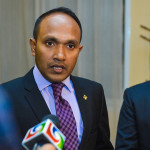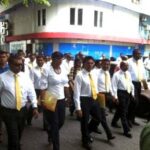In a series of interviews to lead into the the 2014 parliamentary elections – scheduled for March 22nd – Minivan News will be conducting a series of interviews with incumbent MPs.
All 77 sitting members have been contacted, from across the political spectrum, to be asked a standardised set of questions with additional topicals. The interviews will be published as and when they are received.
As part of the series, Minivan News interviewed Hamid Abdul Ghafoor, MP for the Henveiru South constituency.
Ahmed Rilwan: What made you enter the political arena and how?
Hamid Abdul Ghafoor: In my case it was more about what I could do for the party. When I joined the MDP the first question I asked was what can I do for you. So I have been doing what the party – as collective – felt was the best thing I could do for the party. They recognize what I could do collectively.
I was studying in New Zealand when MDP was formed. I kept in touch through the internet, because I shared the same ideology. In 2005 I returned to Maldives and when President Mohamed Nasheed started registration for the party at ‘Dhunfini Haruge,’ [MDP office] I signed on the first day.
AR: Based on your attendance and work in this ending term, how would you judge your performance as an MP?
HG: The biggest and most important privilege I had during my term was to introduce the Decentralisation Bill on the party’s behalf and to push and get it through. Because of that we came to have local councils, and that changed this country.
That the MDP tasked me with the lobbying of such an important bill shows its confidence in me. We got about 70 percent of the bill through, but we still have thirty percent more to go. For instance there is no fiscal decentralisation, it is a problem that I am very concerned about. Decentralisation is key to democracy and economic development.
We stood up against the coup, risking ourselves, even in terms of reputation. I believe even in future there is a role for activism, we are not beyond that. Some people find it difficult to understand MPs as activists, but I define myself as an activist even though I am an MP.
As an MP I stood up for members’ privileges. I’m not a supporter of material privileges, but the protecting the votes of citizens is more important for me. I see the vote I cast as a vote from my constituents. I was standing up for the legal protection of the members against their attempts to minimize the influence of MDP after the coup. They had charges against one third of our parliamentary group at different stages – with police, prosecutor general and in the courts. I stood up against that. I stayed 27 days in parliament, 10 days in house arrest and 2 days in jail
A great achievement of the MDP, myself included, is taking a parliament that was in an undemocratic culture into a democratic one. We contributed to establish a democratic culture with a democratic outlook.
This People’s Majlis passed more bills than any other in the parliamentary history of Maldives. This was a historic People’s Majlis. People became more aware of the role of MPs in national development, and I suspect it could be because of this that the opposition tried to damage the reputation of the Majlis and targeted its members. If there is an undemocratic culture they will target MPs, and standing up against this was an important achievement for me.
I worked in the Committee on Independent Institutions and the Social Affairs Committee, I was the Secretary General of the MDP Parliamentary Goup – to which I was elected each year for the past five years, I was the Chair of Media subcommittee in the Committee on Independent Institutions and the Social Affairs Committee, and the MDP disciplinary committee chair.
Within the party, in addition to being the former secretary general, I was a member of the Foreign Policy Committee and the party’s international spokesperson. I am the vice chair of the MDP Policy Committee, and currently chair of the Disciplinary Committee.
All these is an indication of the amount of trust the party has in me. I believe that the party is bigger than the individual. I am one of many people who define this party. Changes can be brought not by myself individually, but collectively through working with others. I am a hundred percent party person.
AR: What are the main committees you were in? Which bills did you focus on?
HG: I am in two committees; one is the Committee on Independent Institutions where I have lobbied for more funding for independent commissions because democracy will not kick in without empowerment of independent commissions. We need a democratic culture in the Maldives, and independent commissions play an important role in creating this. Their mandates were very narrow because the parliament came from an undemocratic culture.
MDP initially did not have a majority in this committee, but when the judicial transition went wrong – especially by making their qualifications a symbolic issue – the independent institutions committee was equally divided between MDP and the opposition, with independent MP Mohamed ‘Kutti’ Nasheed as chair. But considering the circumstances, the committee was reasonably successful.
The other one is the Social Affairs Committee. It was an opposition dominated committee, and I am critical of that committee. It was slow and dull, we couldn’t perform well within that committee. But we were able to dilute issues, and that is our achievement. We stopped many unacceptable actions.
After the coup, for instance in the health sector is the Thalassemia Bill. It was passed by this committee to dismantle the decentralised system. It was hard for us to promote liberal thinking with regards to labor rights within that committee because of the conservative attitude within the committee.
The decentralisation bill was the main bill I focused on. I was involved in lobbying for other bills such as the tax bills and social protection bill. These bills brings about major policy changing laws. I was very vocal in lobbying for social protection.
We had to work against a tide of centralisation and money politics of big businesses. We fought very hard against this. We promoted ethical and democratic values to the Majlis.
AR: What would you say are the biggest achievements within your term; in terms of what you have accomplished for your constituency and the country as a whole?
HG: For my constituency, the biggest contribution was to get them more representation through decentralisation bill and further democratisation and empowerment of the constituents. Another thing is housing, a lot of my constituents got flats. This was a relief for many who were living in highly congested houses. But because of the coup many of the flats that could have been theirs were taken away.
Annually, nearly MVR5 million (US$324,254) worth of assistance is provided for my constituents under social protection programs. The recipients include elderly, orphans, persons with disabilities and single parents. Education and training opportunities were also provided for constituents under MDP policies.
AR: What would you say is the biggest blunder/mistake/worst step you have taken in your political career, why?
HG: There is no big blunder that I know of, I think it is for others to say. My biggest regret, however, is not getting the chance to make significant contributions towards the development of the People’s Majlis, mainly because I was focused on other issues.
AR: Some people see your actions following the Hondaidhoo case, especially taking refuge in the parliament as bad decision, what do you say to this?
HG: It was done against the judiciary, in defense of the right of the people to be represented in the parliament. It was not a bad decision, I am happy about it.
AR: Are you taking the optional committee allowance of an additional MVR20,000? Why or why not?
HG: I don’t take it, and I voted against it. However I believe they should be well paid in order to reduce the chances for corruption, especially to counter money politics. I voted against it because under that government it wasn’t necessary. But after that government they were trying to harm members of the parliament. With the coup I changed my mind about that.
AR: What is your view about MPs and other public servants declaring their financial assets publicly for the electorate to be able to refer to?
HG: I believe we have in our parliament, people who cant distinguish their personal property with state property. People who have an incestual economic relationship with the state. Assets should be declared. I support that.
AR: Are you re-contesting in the next elections? What do you hope to accomplish should you be elected for a new term?
HG: Yes, I am. First thing I would target is judicial reform, then significant economic reform and then social reform. These are the major hurdles we face. Without judicial reform we cannot do anything, there is no hope without it.
AR: What improvements do you feel the 18th Majlis will need to make as an institution?
HG: If I get re-elected I will work for a total overhaul of the parliament. The Majlis budget is relatively small for one of the three powers of the state. Manpower and buildings are needed for the parliament. We need a lot of qualified people in there. We need to increase the institution’s technical capacity too.
AR: What are your thoughts on party switching – do you think it undermines the party system?
HG: It is a very common practice in an emerging democracies. It is connected to the social fabric of the place, to the absence of good governance and to money politics. It is an obstacle for the parliament and the whole system. We do not hear of this so often in advanced democracies. This can be dealt with through legislation and a culture of good governance. We have a two thousand years of written history, we did not have a democratic system or a culture. But considering the scale at which it (party switching) is happening, we should confront it and consistently fight against it.
It will continue to happen here, but I think it will settle in a near future. Because people of Maldives learn really fast. Considering the changes within the past eight years, I am very optimistic.
AR: Anything else you want to add about what you want to see in the coming years as an MP if you are elected, or as a member of MDP?
HG: My urge is to sustain our democratic gains and to improve upon it, without losing any. Democratic gains include taxation, economic reform, decentralisation, separation of powers, setting up of independent institutions. We are not moving back, we are moving forward.






Fiscal federalism is impossible given the lack of human resource to manage finances at the local government level.
Also the past years has shown us that councils are yet unable to file necessary financial documents needed for proper auditing.
Therefore, in my humble opinion, talk of fiscal decentralization as purely a political tactic aimed at attracting votes while willfully ignoring the potential damage to the State and continued loss of confidence in the institution of local government.
Shame on you MP Hamid Abdulghafoor. Your entire tenure has clearly shown that you are a loyal party puppet who is incapable of making independent choices for the sake of any principles that you may hold or for the sake of your constituents.
It is wonderful news MP Hamid to hear you are contesting for a second term.
We need more people like you from MDP.